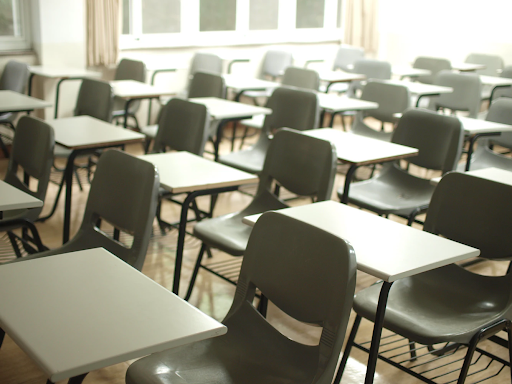Many schools moved online as the COVID pandemic hit, affecting students worldwide. Image Source: Unsplash
By: Matthew Wong
While numerous news sources and organizations have reported upon the logistics and direct physical health affects of COVID-19 throughout the pandemic, few have reported on its significant impacts on the health and performance of adolescents and youth.
Since the initial implementation of quarantine measures in early 2020, it was apparent that the life of students would drastically change. Fueled by social isolation, financial and academic stress, COVID-19 misinformation, fear of the virus, and numerous other factors, students have reported symptoms of anxiety, depressive thoughts, changes in appetite, social isolation, difficulties with concentration, body aches, and numerous other worrying physical and mental health effects throughout the pandemic. Resultingly, according to the Foundation of Economic Education, the pandemic has contributed to “surging rates of depression and suicide among young people, as well as rising incidences of drug overdoses and related deaths.”. For instance, a study from the New York Times reported “an alarming increase in student suicides” in Las Vegas, where 18 students committed suicide over the span of nine months of quarantine. The youngest student was only nine. Similar trends have been noted in the United States, China, Canada, India, and many other parts of the world.
While everyone is prone to be mentally affected from the virus, those already suffering from mental health disorders, or from external financial/academic stress factors, are often most vulnerable to poor mental health.
The pandemic’s significant impacts on the physical and mental health of students, in addition to rapid school closures and the transition into online learning, has largely reflected onto students’ academic performance. MSN News reported, “58% of surveyed parents reported that their child’s academic development had been negatively impacted by the pandemic” according to the latest report from the Early Learning Study at Harvard. Many students reported to have trouble focusing, communicating, and applying their learning in class.
Consequently, students between the grades 3-8, in public schools across the United States were reported to have, “the math achievement of students in 2020 was about 5 to 10 percentile points lower compared to same-grade students the prior year.” according to a study run by The Brookings Institution. This is all the more reason for a focus on mental health and self-care strategies. Students need to be aware of the ways to help cope with increasing stress. Luckily, conversations have become more open regarding topics relating to mental health lately.
As COVID-19 comes to a close, its important that schools, parents, and the media pay closer attention to COVID-19’s affect on students’ health, and prioritize our adolescent populations’ well-being. Institutions and government organizations should provide students the academic, and mental health resources they need, as we near the arrival of the following school year.
Works Cited
“Covid-19: How to Manage Your Mental Health during the Crisis.” Mayo Clinic, Mayo Foundation for Medical Education and Research, 15 Oct. 2020, www.mayoclinic.org/diseases-conditions/coronavirus/in-depth/mental-health-covid-19/art-20482731.
Gordon, Joshua. “One Year In: COVID-19 and Mental Health.” National Institute of Mental Health, U.S. Department of Health and Human Services, 9 Apr. 2021, www.nimh.nih.gov/about/director/messages/2021/one-year-in-covid-19-and-mental-health.
“The Impact of Covid-19 on the Mental Health of Adolescents and Youth.” UNICEF Latin America and Caribbean, www.unicef.org/lac/en/impact-covid-19-mental-health-adolescents-and-youth.
Javed, Bilal, et al. “The Coronavirus (Covid-19) Pandemic's Impact on Mental Health.” The International Journal of Health Planning and Management, John Wiley & Sons, Ltd., Sept. 2020, www.ncbi.nlm.nih.gov/pmc/articles/PMC7361582/.
Keiser, Cayla. “How COVID-19 Has Affected College Students' Mental Health.” Verywell Family, www.verywellfamily.com/how-covid-19-has-affected-college-students-mental-health-5088738.
Kuhfeld, Megan, et al. “How Is COVID-19 Affecting Student Learning?” Brookings, Brookings, 3 Dec. 2020, www.brookings.edu/blog/brown-center-chalkboard/2020/12/03/how-is-covid-19-affecting-student-learning/.
Lee, MChe. White Table and Black Chairs Photo. Oct. 2020.
Mahdy, Mohamed A A. “The Impact of Covid-19 Pandemic on the Academic Performance of Veterinary Medical Students.” Frontiers in Veterinary Science, Frontiers Media S.A., 6 Oct. 2020, www.ncbi.nlm.nih.gov/pmc/articles/PMC7572855/.
McDonald, Kerry. “Youth Depression, Suicide Increasing During PANDEMIC Response: Kerry McDonald.” FEE Freeman Article, Foundation for Economic Education, 27 Jan. 2021, https://fee.org/articles/youth-depression-suicide-increasing-during-pandemic-response/.
“Mental Health and Covid-19.” World Health Organization, World Health Organization, www.who.int/teams/mental-health-and-substance-use/covid-19.
Son, Changwon, et al. “Effects of Covid-19 on College Students' Mental Health in the United States: INTERVIEW Survey Study.” Journal of Medical Internet Research, JMIR Publications, 3 Sept. 2020, www.ncbi.nlm.nih.gov/pmc/articles/PMC7473764/.

